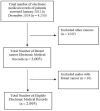Bayesian Model Prediction for Breast Cancer Survival: A Retrospective Analysis
- PMID: 40421497
- PMCID: PMC12180110
- DOI: 10.4274/ejbh.galenos.2025.2025-2-14
Bayesian Model Prediction for Breast Cancer Survival: A Retrospective Analysis
Abstract
Objective: Over the recent years, machine learning (ML) models have been increasingly used in predicting breast cancer survival because of improvements in ML algorithms. However, cancer researchers still face a significant challenge in accurately predicting breast cancer patients' survival rates. The purpose was to predict breast cancer survival using a Bayesian network.
Materials and methods: This retrospective study included 2,995 patients diagnosed with breast cancer and subsequently hospitalized between January 1, 2012, and December 30, 2024. SPSS Modeler version 18.0 was used to build prediction models. The data were randomly split into a training set (2,097 cases, 70%) and a test set (898 cases, 30%) for developing the Bayesian network model and predicting the overall survival of patients diagnosed with breast cancer. The model included demographic variables (age, marital status, and governorate), laboratory/clinical variables (hemoglobin level, white blood cell count, presence of hypertension, and diabetes mellitus) and the outcome variable, patient survival status (binary value: survived/died). The discriminative ability of models was evaluated by accuracy and the area under the curve (AUC) in terms of superior predictive performance for breast cancer outcomes.
Results: The Bayesian model exhibited the best discriminatory performance among the nine models, with an AUC of 0.859 and the highest accuracy of 96.661%. In the context of feature importance, white blood cell value at the time of diagnosis was the most important feature for predicting the survival of breast cancer. Patients who had below-normal hemoglobin and above-normal white blood count values had a higher death probability than patients who had normal white blood count and hemoglobin values. The presence of hypertension and diabetes mellitus in patients with breast cancer led to a reduced survival probability.
Conclusion: The Bayesian model outperformed the other models in predicting the survival probability of breast cancer. Routine laboratory testing and demographic data can be included in a ML model to predict breast cancer survival. Accurate prediction of breast cancer survival is vital for clinical decision-making.
Keywords: Bayesian model; breast cancer; machine learning; prediction models; survival.
©Copyright 2025 by the Turkish Federation of Breast Diseases Societies / European Journal of Breast Health published by Galenos Publishing House.
Conflict of interest statement
Conflict of Interest: No conflict of interest was declared by the authors.
Figures
Similar articles
-
Cost-effectiveness of using prognostic information to select women with breast cancer for adjuvant systemic therapy.Health Technol Assess. 2006 Sep;10(34):iii-iv, ix-xi, 1-204. doi: 10.3310/hta10340. Health Technol Assess. 2006. PMID: 16959170
-
Development of machine learning model for predicting prolonged operation time in lumbar stenosis undergoing posterior lumbar interbody fusion: a multicenter study.Spine J. 2025 Mar;25(3):460-473. doi: 10.1016/j.spinee.2024.10.001. Epub 2024 Oct 19. Spine J. 2025. PMID: 39427930
-
A rapid and systematic review of the clinical effectiveness and cost-effectiveness of paclitaxel, docetaxel, gemcitabine and vinorelbine in non-small-cell lung cancer.Health Technol Assess. 2001;5(32):1-195. doi: 10.3310/hta5320. Health Technol Assess. 2001. PMID: 12065068
-
The effectiveness and cost-effectiveness of carmustine implants and temozolomide for the treatment of newly diagnosed high-grade glioma: a systematic review and economic evaluation.Health Technol Assess. 2007 Nov;11(45):iii-iv, ix-221. doi: 10.3310/hta11450. Health Technol Assess. 2007. PMID: 17999840
-
Signs and symptoms to determine if a patient presenting in primary care or hospital outpatient settings has COVID-19.Cochrane Database Syst Rev. 2022 May 20;5(5):CD013665. doi: 10.1002/14651858.CD013665.pub3. Cochrane Database Syst Rev. 2022. PMID: 35593186 Free PMC article.
References
-
- Chhikara BS, Parang K. Global cancer statistics 2022: the trends projection analysis. Chem Biol Lett. 2023;10:451.
-
- Kumari D, Naidu MVSS, Panda S, Christopher J. Predicting breast cancer recurrence using deep learning. Discover Applied Sciences. 2025;7(2):113. doi: 10.1007/s42452-025-06512-5. - DOI
LinkOut - more resources
Full Text Sources




